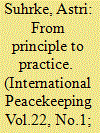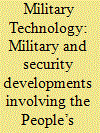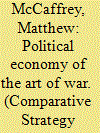|
|
|
Sort Order |
|
|
|
Items / Page
|
|
|
|
|
|
|
| Srl | Item |
| 1 |
ID:
136770


|
|
|
|
|
| Summary/Abstract |
The author gives his view on China’s response to the events unfolding in Ukraine, and looks at the economic and geopolitical reasons behind China’s concern over the Ukrainian crisis.
|
|
|
|
|
|
|
|
|
|
|
|
|
|
|
|
| 2 |
ID:
137101


|
|
|
|
|
| Summary/Abstract |
This article looks at the failure of the Japanese Army and Navy to use Hong Kong to control the South China coast between 1942 and 1945. This was the result of their inability to cooperate at the strategic and operational levels and also of their shortage of resources. In addition, the flawed shipping-protection tactics adopted by the Japanese Navy, the incomplete control of the Japanese forces over the South China coast, and the resistance of Allied guerrilla and intelligence units, all helped prevent Hong Kong from becoming a useful base for the Japanese. The Japanese sought to dominate the South China Sea through a huge land offensive, but the costly campaign did not alter the course of the war.
|
|
|
|
|
|
|
|
|
|
|
|
|
|
|
|
| 3 |
ID:
137142


|
|
|
|
|
| Summary/Abstract |
During its engagement in Afghanistan, the US military seriously tried to mitigate the risk of civilian casualties from airstrikes only when called for by changes in military doctrine emphasizing the need to gain the support of the population. Consistent efforts by external political and humanitarian actors to reduce casualties by demanding more transparency and clearer lines of accountability for ‘collateral damage’ had little immediate, observable effect. The case study underlines the contingent nature of progress towards protecting civilians in armed conflict even when a military institution formally accepts the principles of customary international humanitarian law, but concludes that, faute de mieux, strategies to enhance protection through greater accountability and attention to the kind of military ordinance used remain central.
Over time there have been significant advances in international humanitarian law to strengthen the protection of civilians during armed conflict, and, as Adam Roberts notes, ‘in practice something has been achieved’.1 The record of the US military forces in Afghanistan after 2001, however, underlines the element of contingency in this development. During more than a decade of combat engagement in Afghanistan, the US military operated in a context of customary international law that was formally observed, but measures to reduce the impact of military operations on civilians varied significantly in practice. Only in two short periods did the USA or joint ISAF (International Security Assistance Force) command adopt practices to seriously mitigate the risk of civilian casualties. What explains this variation over time, and what does it tell us about the influence of legal norms on the belligerent?
Civilian casualties produced by US airstrikes produced the vast majority of casualties attributed to allied operations in Afghanistan. Authoritative sources reported almost 2,000 were killed and many more injured in the period 2006–13 (see Table 1).2 The US military and ISAF considered the civilian deaths as incidental damage – the unfortunate, accidental effects of war. Yet as Neta Crawford has argued, these effects were systemic in nature.3 They were ‘normal accidents’ in the sense originally developed by Charles Perrow: the predictable outcome of a flawed system design.4
|
|
|
|
|
|
|
|
|
|
|
|
|
|
|
|
| 4 |
ID:
136906


|
|
|
|
|
| Summary/Abstract |
The paper disclose the origin and evolution of the national security concept in US political science, analysing the structure of US national security strategy and its relations relation to military policies and military strategy.
|
|
|
|
|
|
|
|
|
|
|
|
|
|
|
|
| 5 |
ID:
136733


|
|
|
|
|
| Summary/Abstract |
In contrast with a widespread perception of Russia as an expansionist power in the Arctic, this article argues that Moscow does not seek military superiority in the region. Rather, Moscow's military strategies in the Arctic pursue three major goals: first, to demonstrate and ascertain Russia's sovereignty over its exclusive economic zone and continental shelf in the region; second, to protect its economic interests in the High North; and third, to demonstrate that Russia retains its great power status and still has world-class military capabilities. The Russian military modernization programs are quite modest and aim at upgrading the Russian armed forces in the High North rather than providing them with additional offensive capabilities or provoking a regional arms race. The Russian ambitions in the Arctic may be high, but they are not necessarily implying the intentions and proper capabilities to confront other regional players by military means. On the contrary, Moscow opts for soft rather than hard power strategy in the Arctic.
|
|
|
|
|
|
|
|
|
|
|
|
|
|
|
|
| 6 |
ID:
135605


|
|
|
|
|
| Summary/Abstract |
this article addresses the current and probable future course of military technological development of the People’s Republic of China (PLA) and the tenets and probable development of Chinese security strategy and military strategy.
|
|
|
|
|
|
|
|
|
|
|
|
|
|
|
|
| 7 |
ID:
134652


|
|
|
|
|
| Summary/Abstract |
Sun Tzu's The Art of War deals with the economic aspects of military operations as well as some more general economic principles. This article studies several of its economic ideas in turn: on war and the state, the effect of war on economic affairs, and the role of incentives in promoting desired behavior within military organizations. It also discusses how the text treats ideal military strategy as a matter of opportunity discovery, analogous to entrepreneurship in the work of Israel Kirzner.
|
|
|
|
|
|
|
|
|
|
|
|
|
|
|
|
| 8 |
ID:
136637


|
|
|
|
|
| Summary/Abstract |
In analyses of China's military modernization, it has become increasingly common to describe China as pursuing a “counter-intervention” strategy in East Asia. Such a strategy aims to push the United States away from China's littoral, forestalling the United States’ ability to intervene in a conflict over Taiwan or in disputes in the East and South China Seas. Moreover, such a military strategy is consistent with a purported broader Chinese goal to displace the United States from its traditional regional role, including Washington's support for global norms such as freedom of navigation in Exclusive Economic Zones (EEZs) and partnerships with long-standing treaty allies.
|
|
|
|
|
|
|
|
|
|
|
|
|
|
|
|
| 9 |
ID:
136695


|
|
|
|
|
| Summary/Abstract |
Environmental devastation is not only a byproduct of war, but has also been a military strategy since ancient times. How have the norms and laws of war addressed the damage that war inflicts on the environment? How should “environmental war crimes” be defined and addressed? I address these questions by critically examining the way that distinctions between legitimate and illegitimate wartime environmental destruction have been drawn in debates on just war theory and the laws of war. I identify four distinctive formulations for framing the wartime significance of nature that appear in such debates and analyze how each is associated with distinctive claims regarding what constitutes “humaneness” in times of war: nature as property; nature as combatant; nature as Pandora's Box; and nature as victim. I argue that efforts to investigate and judge the environmental impact of war destabilize and expose the limitations of core distinctions that animate humanitarian norms, but also offer an important and neglected source of guidance in addressing those limitations.
|
|
|
|
|
|
|
|
|
|
|
|
|
|
|
|
| 10 |
ID:
136905


|
|
|
|
|
| Summary/Abstract |
The authors put forward their views on the significance of sea power for this country in the 21st century and the impact of the sea power on the defence of the country’s interest in the new military strategy settings.
|
|
|
|
|
|
|
|
|
|
|
|
|
|
|
|
| 11 |
ID:
134232


|
|
|
|
|
| Summary/Abstract |
It was October 2009, just days after a brazen Taliban attack on a remote American military base in eastern Afghanistan killed eight of the 53 members of his unit and wounded 27 others. The trim 29-year-old had hauled ammunition to pinned-down U.S. troops and killed close to a half-dozen Taliban fighters. His acts of bravery helped keep the tiny base from being completely overrun and later earned him the Medal of Honor, the U.S. military's highest commendation. Carter didn't feel like a hero, however. Alone at night, tossing and turning in his bed, he couldn't escape the sounds of that fateful firefight and the sight of Spc. Stephan Mace -- immobilized after his legs had been blown away -- begging for help, tears streaming down his dirt-covered face. Carter had raced across the battlefield and treated the 21-year-old's wounds, but, ultimately, Mace died during surgery just hours later. Carter felt that he had failed his comrade; if only he'd moved faster, he thought, Mace would have lived. And though Carter's platoon sergeant encouraged him to feel proud about having helped save other troops, "I couldn't really hear him," he said during a recent speech in Maryland. "I was more focused on getting to my bunk, burying my head into a pillow, and not existing. I wanted to find a deep hole and just disappear."
|
|
|
|
|
|
|
|
|
|
|
|
|
|
|
|
| 12 |
ID:
136701


|
|
|
|
|
| Summary/Abstract |
Nuclear weapons will come to loom larger—and perhaps much larger—than they have since the Cold War over U.S. and Chinese military planning.
|
|
|
|
|
|
|
|
|
|
|
|
|
|
|
|
|
|
|
|
|